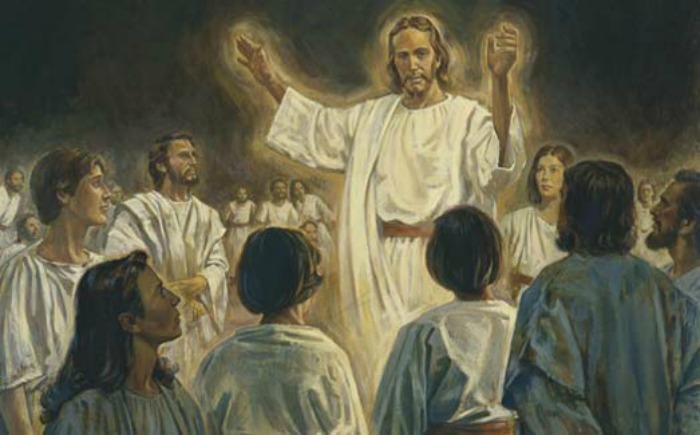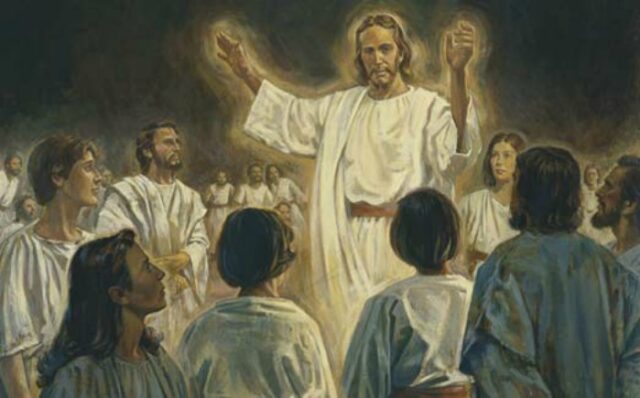QUESTION: Hello pastor I want you to explain to me what these verses in 1 Peter 3:19–20 mean. “By which also he went and preached unto the spirits in prison; which sometime were disobedient when once the long suffering of God waited in the days of Noah, while the ark was a preparing, wherein few, that is, eight souls were saved by water.” Amos
RESPONSE: Normally when someone asks; ‘what does this text mean?’ to a trained Bible teacher, they have asked way much more than they assume they are asking.
In my training about responding to questions asked in public as opposed to those asked privately, you have to respond to both the needs of the one who posed the question and to the probable interests of the listening public in general.
It is my prayer, therefore, that the Lord helps both audiences be served by my response.

Context of the passage
1 Peter 3:18 is the immediate context of the passage. In Biblical interpretation (and in most literature works) context is very important.
Context is one of the rules of Bible interpretation, and we must understand these rules as we attempt to interprete the Bible.
From this particular context, it is important to note: It is in the Bible (Salvation History/Heilsgeschichte), it is in the Epistle of Peter (Genre), it was dictated by Peter and transcribed by Mark (Authorship) and it is a passage from this section of Peter (Theme).
In Bible interpretation, there are other 6-7 rules to follow and these always work collaboratively. But in the interest of space and context let us now turn to the section where the verses in question are.
There are five theological themes in the first epistle of Peter:
l Suffering (1:6-7; 2:21)
l Holiness/Sanctification/New Birth (1:2-3, 14-18, 23)
lSalvation/Atonement/Victory (1:3,5,9-13; 4:7; 5:4,10; 3:18-20)
l Priesthood of all Believers/Community/Relationships (1:13-18; 2:9, 13-17, 25; 4:8-11; 5:2)
lReturn of the Lord/Eschatology (1:3-5,9,13).
As you can see, the passage falls under the salvation theme and therefore to interpret it right, we need to subject the author’s view to the general salvation history as stated in the Bible.
Who were the spirits?
1Peter 3:18-20 tells us that Jesus, the just, suffered on behalf of the unjust to secure them.
He then went and ‘preached’ to the ‘spirits’ in prison and these spirits were formerly disobedient to the preaching of Noah and did not enter the Ark, the then provision.
Before we find out who they were, we need to know who they were not.
Peter tells us in verse 19 that Jesus proclaimed (Greek: Kerusso) not preached (Greek: eungellizo).
It is important to understand that in the New Testament whenever Jesus is presented to humanity, the Greek transliteration is ‘Eungellizo’ but when Jesus is presented to the opposition (Anti-Christ inhuman/human) the Greek transliteration is ‘Kerusso’.
Whoever these spirits in 1Peter were, what was for them was a declaration, a proclamation-Kerusso (information of the new normal-Mark 16:15, 1Corinthisn 1:23; 2Corinthians 4:5) not evangelism (1Peter 4:6; 1Corinthian 9:16) for conversion since these were not objects of salvation.
So Peter believes there were demons that hold people captive to fail them, (they failed to enter the Ark). And it is those spirits in prison (Greek Transliteration is fulake-under guard).
We know this was not a prison’s ministry Jesus was involved into. He proclaimed His victory over them, rendering their captivity vain henceforth.
Do the dead hear?
After the waters in 1Peter 3:18-20 settle, Peter stirs other waters in verse 4:6 when he writes:
“For unto this end was the Gospel preached even to the dead, that they might be judged indeed according to men in the flesh, but live according to God in the spirit.”
Is the Gospel preached to the dead, do the dead know or hear a thing? At least not according to other parts of the Bible (Ecclesiastes 9:5; Psalms 6:5; 115:17).
The Greek word translated as the dead in 4:6 is Nekrois. Therefore, they can hear.
Jesus, in John 11:14, 32, refers to the dead as those asleep.
He also said in John 5:25 that the dead will hear, and Apostle Paul in 1Thessolonians 4:13-18 emphasise the same.
Do the dead hear then? The answer is yes, they hear but they can only hear God and ever since, the kind of Lazarus event b will happen only at the end of the world in the eschatological event of the resurrection. So no dead hears a thing from any other agent and outside that time.
As for 1Peter 4:6, the Nekrois (dead) is used figuratively as it is used in other parts of the New Testament:
lof persons unable to respond to God because of moral badness or spiritual alienation dead, powerless (Ephesians 2.1, 5);
l of persons regarded as dead because of separation dead (Luke 15.24, 32);
l of persons no longer under the control of something dead to (Romans 6.11).
The reason for this conclusion is in the contextual reading of 1Peter 4:1-5. Here, Peter discusses the formerly dead in the flood of sins and in verse 6, he adds that these were evangelised and not proclaimed to like the anti-Christ spirits. I hope this will help.
Believe what God says about you, not what others say.
Answered by Pr Isaiah White.






















